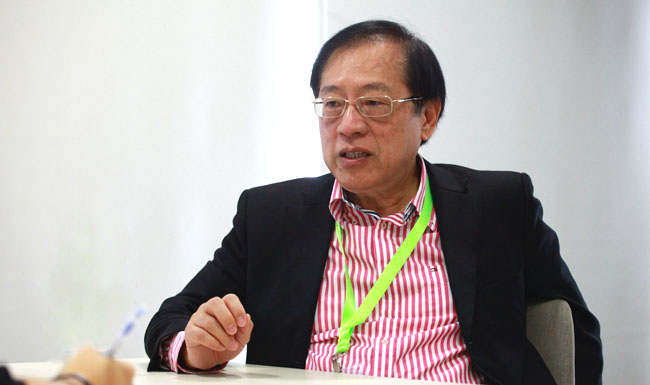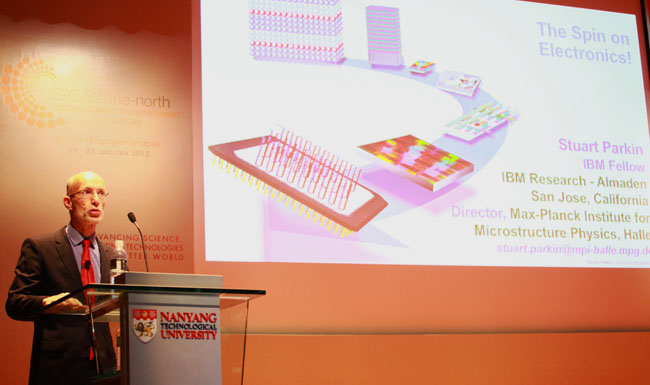
“We are entering these days the probably most significant revolution medicine has ever gone through in its history, and that’s the revolution of personalized medicine. It’s the dream of the people to always remain young and to find cures to all diseases.”
AsianScientist (Jan. 22, 2014) – Professor Aaron Ciechanover, who was awarded the 2004 Nobel Prize in Chemistry for his discovery of ubiquitin-mediated protein degradation, was speaking at the Global Young Scientists Summit 2014 (GYSS@one-north 2014) at Nanyang Technological University in Singapore.
A medical doctor who had turned to scientific research instead of practicing bedside medicine, Prof. Ciechanover discussed the history of medical revolutions in the last century, adding that the next revolution that has already started. However, as historically seen, new treatments for diseases and other medical achievements have always come with a price, he said.
“If you think about the modern history of medicine, there is a price, there are no free lunches,” Prof. Ciechanover said. “At the turn of the 19th to 20th century, people lived on average 50 years and they died mostly of infectious diseases. People did not live long enough to get degenerative diseases such as cancer, Alzheimer or Parkinson’s disease.”
Along with the scientific advances in the 20th century that extended the average life span by 30 years, came the exposure of degenerative conditions such as Alzheimer’s disease. According to Prof. Ciechanover, the price we pay for these advances is the unraveling of the weaknesses of the human organism.
“The human body is such an efficient machine, but there is an end to this efficiency, and the end are these degenerative diseases: heart attack, brain degeneration, cancer, which is the par excellence degenerative disease of the checkpoint quality control of cell division and the failure of the immune system to reject these faulty cells,” Prof. Ciechanover explained.
He stressed that the predominant diseases of the present time are based on four factors: behavior (e.g. smoking), infectious diseases, genetics and environment. Most of these diseases could be avoided by a change in behavior – the behavior of the individual as well as that of governments and the public, for instance in regard to appropriate actions for a healthy environment and education.
Four medical revolutions in one century
“Medicine today is moving in three parallel directions,” said Prof. Ciechanover. “One direction is obviously the one of medical devices. If you look at the big achievements such as in sophisticated imaging, gamma knifes, replacement surgery, engineering has played the most important role in the development of medicine in the last few decades and it will continue to play a major role in the future. Another direction is regenerative medicine, the use of stem cells and engineered cells to replace damaged tissues, and the third direction is the development of drugs.”
Drugs have always played a central role in medicine. Drug discovery during the first era of the modern history of medicine (1930s to 1960s) was characterized by coincidence. Examples of incidental discoveries Prof. Ciechanover cited include aspirin, first synthesized by German chemist Felix Hoffmann who searched for a substance to ease the pain of his father’s arthritis, and penicillin, discovered by the Scottish biologist Alexander Fleming as a fungal contamination on a petri dish that effectively inhibited bacterial growth.
Serendipity was followed by systematic approaches during the second medical era (1970s to 2000s) that, according to Prof. Ciechanover, was marked by “high throughput brute force screening of large libraries of chemical compounds.” Screening of libraries of chemicals and natural substances “without knowing the biochemical mechanisms and without asking sophisticated questions” led to discoveries of compounds such as statins (inhibitors of cholesterol synthesis, discovered by Japanese chemist Akira Endo), which is the number one selling drug on the market today.
The next era of medicine
As Prof. Ciechanover pointed out, we are now transitioning into the fourth medical era, that of personalized medicine. Medicine in all previous eras followed the concept of “one size fits all,” and individual genetics, diet and background were generally not taken into account during treatment. The results were failing treatments and an abundance of adverse drug reactions leading to many deaths.
“Medicine is going to be personalized, it’s going to be predictive, it’s going to be preventive, and it’s going to be participatory. The patients are going to take part in the decision making process of their own fate,” said Prof. Ciechanover. “It will all be based on our own repertoire of DNA and RNA and proteins, therefore it’s going to be personalized. The treatment will change from treating the disease to treating the disease within the context of the patient.”
Today, patients with a common cancer such as breast cancer are still subjected to nearly identical treatments, with largely varying outcomes because of the biological differences between them.
Prof. Ciechanover gave examples of personalized medicine approaches for cancer patients. For example, large-scale genomic studies of cohorts of 1,000 patients will help to predict a patient’s response to certain treatments, he said. In addition, rapid developments in sequencing technologies, with the most recent techniques allowing the deciphering of a patient’s genome in less than an hour for about US$1,000, will also lead to advances in personalized medicine.
“Together with advances in transcriptomics, proteomics and metabolomics, looking at a patients RNA, proteins and small metabolites, we are on the way to profile each person very quickly and cheaply,” said Prof. Ciechanover. “We are already in transition into the fourth era of medicine and this revolution is going to be the biggest one.”
Prof. Aaron Ciechanover received the 2000 Albert Lasker Award, the 2003 Israel Prize and the Nobel Prize in Chemistry in 2004 among numerous other awards. He is attending the Global Young Scientists Summit 2014, organized by the National Research Foundation of Singapore, that is taking place from January 19 to 24, 2014 at Nanyang Technological University
——
Copyright: Asian Scientist Magazine.
Disclaimer: This article does not necessarily reflect the views of AsianScientist or its staff.












